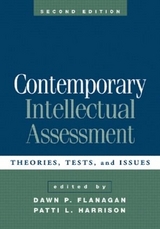
Contemporary Intellectual Assessment, First Edition
Guilford Publications (Verlag)
978-1-57230-147-4 (ISBN)
- Titel erscheint in neuer Auflage
- Artikel merken
Now in a thoroughly revised and expanded second edition, this comprehensive work provides the most current information about theory and research on assessment of intellectual abilities and processes. Leading test authors, theorists, and scholars review the conceptual and research underpinnings of recent editions of intelligence tests, including the WISC-IV, KABC-II, SB5, and WJ III, and offer recommendations for interpretation. Highlights include new and fully revised chapters on assessment of special populations, including culturally and linguistically diverse individuals, preschoolers, and children with learning disabilities. Other new chapters describe cutting-edge interpretive approaches (e.g., nondiscriminatory and cross-battery methods) and current theories (e.g., CHC theory, Gardner's MI theory, Sternberg's triarchic theory of successful intelligence, Luria's theory of information processing); outline ways to link assessment to interventions; and address standards-based educational reform.
Dawn P. Flanagan, Ph.D., an Assistant Professor of School Psychology at St. John's University in New York, conducts research on intelligence, psychoeducational and preschool assessment, and professional issues in school psychology. Widely published, she serves on the editorial boards of the Journal of Psychoeducational Assessment and School Psychology Review and is past president of the New York State Psychological Association's School Division. Judy L. Genshaft, Ph.D., is the Interim Vice President for Academic Affairs at the University at Albany, State University of New York. She has edited two books and written numerous journal articles and book chapters. A licensed psychologist who is on the editorial board of School Psychology Review, she has received several awards and honors for her contributions to the National Association of School Psychologists. Patti L. Harrison, Ph.D., a Professor in the Educational and School Psychology Program and Assistant Dean of the Graduate School at the University of Alabama, has conducted extensive research on intelligence, adaptive behavior, and preschool assessment. Widely published, she is Editor of School Psychology Review, an editorial board member for several journals, a past-chair of the NASP Children's Services Committee, and a past Vice President of Publications, Communications, and Convention Affairs for APA's Division of School Psychology.
I. The Origins of Intellectual Assessment
1. The Early History of Intelligence Testing, Thorndike
2. The History of Test Development, Ittenbach, Esters, and Wainer
3. A History of Intelligence Test Interpretation, Kamphaus, Petoskey, and Morgan
II. Contemporary and Emerging Theoretical Perspectives
4. Human Cognitive Capabilities: Gf-Gc Theory, Horn and Noll
5. The Triarchic Theory of Intelligence, Sternberg
6. Alternative Assessment from a Multiple Intelligences Theoretical Perspective, Chen and Gardner
7. The Three-Stratum Theory of Cognitive Abilities, Carroll
8. The Role of Intelligence in a Broad Model of Personal Competence, Greenspan and Driscoll
9. Analysis of the Major Intelligence Batteries according to a Proposed Comprehensive
Gf-Gc Framework, McGrew
III. New Tests and Alternative Techniques for Assessing Intelligence
10. The Differential Ability Scales, Elliott
11. The Kaufman Adolescent and Adult Intelligence Test, Kaufman and Kaufman
12. The Woodcock Johnson Tests of Cognitive Ability Revised, Woodcock
13. Planning, Attention, Simultaneous, and Successive Theory and the Das Naglieri Cognitive Assessment System: A Theory-Based Measure of Intelligence, Naglieri
14. The Universal Nonverbal Intelligence Test, McCallum and Bracken
15. Dynamic Assessment Approaches, Lidz
16. The Learning Potential Assessment Device, Feuerstein, Feuerstein, and Gross
17. A Cross-Battery Approach to Assessing and Interpreting Cognitive Abilities: Narrowing the Gap between Practice and Cognitive Science, Flanagan and McGrew
18. Issues and Suggestions for Training Professionals in Assessing Intelligence, Alfonso and Pratt
IV. Emerging Issues and New Directions in Intellectual Assessment
19. Ontology, Structure, and Diagnostic Benefits of a Normative Subtest Taxonomy from the WISC-III Standardization Sample, Glutting, McDermott, and Konold
20. Using Confirmatory Factor Analysis to Aid in Understanding the Constructs Measured by Intelligence Tests, Keith
21. Contemporary Models for the Biometric Genetic Analysis of Intellectual Abilities, McArdle and Prescott
22. Diagnostic and Treatment Utility of Intelligence Tests, Reschly
23. The Functional Utility of Intelligence Tests with Special Education Populations, Flanagan, Andrews, and Genshaft
24. The Utility of Intelligence Tests for Preschool Children, Bracken and Walker
25. The Cognitive Assessment of Limited English Proficient and Bilingual Children, Lopez
26. The Triple Quandary of Race, Culture, and Social Class in Standardized
Cognitive Ability Testing, Helms
27. An Integration and Synthesis of Contemporary Theories, Tests, and Issues in the
Field of Intellectual Assessment, Harrison, Flanagan, and Genshaft
Appendix A: Ethical Principles of Psychologists and Code of Conduct (Ethical Standard 2).
Appendix B: Code of Fair Testing Practices in Education.
Appendix C: Code of Professional Responsibilities in Educational Measurement
| Erscheint lt. Verlag | 31.1.1997 |
|---|---|
| Zusatzinfo | Illustrations |
| Verlagsort | New York |
| Sprache | englisch |
| Maße | 178 x 254 mm |
| Themenwelt | Geisteswissenschaften ► Psychologie ► Allgemeine Psychologie |
| Geisteswissenschaften ► Psychologie ► Test in der Psychologie | |
| ISBN-10 | 1-57230-147-3 / 1572301473 |
| ISBN-13 | 978-1-57230-147-4 / 9781572301474 |
| Zustand | Neuware |
| Haben Sie eine Frage zum Produkt? |
aus dem Bereich



